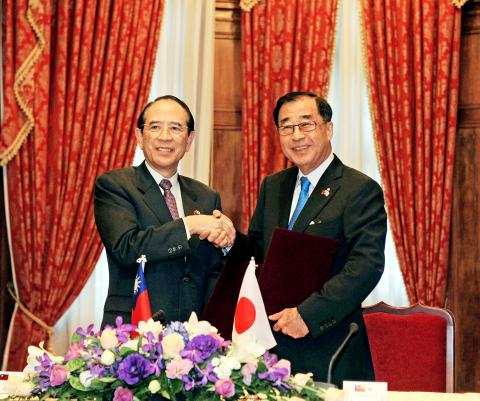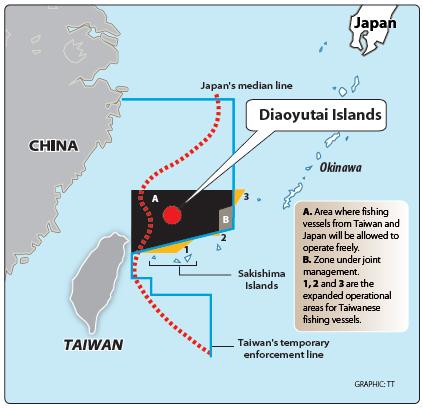Taiwan and Japan yesterday inked a fisheries agreement in a bid to end controversies over fishing in waters surrounding the contested Diaoyutai Islands (釣魚台). The agreement includes an escape clause which Taipei said allows both sides to set aside disputes over their competing sovereignty claims.
The agreement assured Taiwanese vessels an intervention-free fishing zone in waters between 27° north latitude and the Sakishima Islands, Okinawa Prefecture, and gave Taiwan an additional fishing zone of 1,400 square nautical miles (4,800km2) outside Taiwan’s temporary enforcement line, government officials said.
Under the deal, fishing vessels from both countries can operate in a large area within the designated zone without being subject to the jurisdiction of the other side, while a smaller area of the zone, where Japanese fishing vessels frequently operate, is under joint management by the two governments.

Photo: CNA
Provisions under the agreement do not apply to waters within 12 nautical miles — a state’s territorial waters — surrounding the Diaoyutai Islands, because the islands are claimed by both Taiwan and Japan, which calls them the Senkaku Islands.
China also claims sovereignty over the Diaoyutais. Japan and China signed a fisheries agreement in 1997, which took effect in 2000, under which both sides co-manage waters above 27° north latitude.
At the signing ceremony at the Taipei Guest House, Association of East Asian Relations Chairman Liao Liou-yi (廖了以) and Interchange Association, Japan Chairman Mitsuo Ohashi hailed the agreement, which they said marked a big step forward in bilateral relations.

The negotiations yesterday were the 17th round since talks started in August 1996.
Taipei and Tokyo initiated fishery talks following incidents of Taiwanese fishing boats being seized, detained or expelled by the Japan Coast Guard after Tokyo ratified the UN Law of the Sea Treaty in 1996 and set up a 200 nautical mile exclusive economic zone that included waters surrounding the Diaoyutais.
Ohashi said it was “with great pleasure” that the deal was finally signed.
The primary goals were to “maintain peace and stability in East China Sea” and to “strengthen the existing friendly relations with Taiwan,” he said.
At a press conference after the signing ceremony, Minister of Foreign Affairs David Lin (林永樂) said that the agreement did not address the competing claims over the Diaoyutais, as both governments agreed to “set aside the dispute.”
As stated in Article 4, provisions that both sides have agreed to under the deal have no effect on each side’s sovereignty claims over the Diaoyutais, Lin said, adding that the escape clause was written into the agreement at Taipei’s insistence.
"We did not back down one bit over the sovereignty issue in the talks,” Lin said.
Waters within 12 nautical miles surrounding the Diaoyutais were exempted from the agreement because “we insisted that the area is our territorial sea, while Japan upheld its position” that it is theirs, Lin said.
Coast Guard Administration Minister Wang Jinn-wang (王進旺) called on Japanese and Chinese fishing vessels not to operate in waters within the 12 nautical miles surrounding the Diaoyutais and vowed to adopt appropriate measures against Chinese and Japanese fishing vessels to protect the rights of Taiwanese fishermen.
Under the agreement, Taiwan and Japan also agreed to establish a fisheries commission to discuss other issues, including the delineation of overlapping waters in their respective exclusive economic zones above 27º north latitude and waters south of Sakishima Islands, on an annual basis.
Meanwhile, China yesterday expressed concern about the new agreement.
“We are extremely concerned about Japan and Taiwan discussing and signing a fishing agreement,” Chinese Ministry of Foreign Affairs spokesman Hong Lei (洪磊) told a daily news briefing.
“We hope that Japan earnestly abide by its promises on the Taiwan issue and act cautiously and appropriately,” she said.
Additional reporting by Reuters
History of negotiations
‧ First two rounds of negotiations, 1996: Both sides insisted on their respective sovereign claims over the Diaoyutai Islands and did not have substantial discussions about fisheries issues.
‧ Third round of negotiations, 1997: Working-level discussions began about fishing grounds, but delimitation was not discussed.
‧ Fourth, fifth and sixth rounds of negotiations, 1998 to 2000: Taiwan proposed that a commission be set up to co-manage fisheries in the area and that fishing grounds be delimited based on “equitable principle.” Japan rejected the proposals.
‧ Seventh to 15th rounds of negotiations, 2000 to 2005: Taiwan demanded co-management of waters below 27o north latitude and that Taiwanese fishermen have the rights to fish in waters between 27o north latitude to 29o18’ north latitude, because this is within Taiwan’s Exclusive Economic Zone. Japan rejected the proposal and wanted to negotiate based on the principle of a “geographic median line.” It also rejected Taiwan’s claim to fish in waters above 27o north latitude because the area was marked as a zone of joint control between China and Japan in their bilateral fisheries agreement signed in 1997.
‧ Sixteenth round of negotiations, 2009: Consensus was reached on four general principles to deal with disputes on fisheries issues. No substantial discussions on delimitation were held.
Prepared by staff reporter Shih Hsiu-chuan

‘ABUSE OF POWER’: Lee Chun-yi allegedly used a Control Yuan vehicle to transport his dog to a pet grooming salon and take his wife to restaurants, media reports said Control Yuan Secretary-General Lee Chun-yi (李俊俋) resigned on Sunday night, admitting that he had misused a government vehicle, as reported by the media. Control Yuan Vice President Lee Hung-chun (李鴻鈞) yesterday apologized to the public over the issue. The watchdog body would follow up on similar accusations made by the Chinese Nationalist Party (KMT) and would investigate the alleged misuse of government vehicles by three other Control Yuan members: Su Li-chiung (蘇麗瓊), Lin Yu-jung (林郁容) and Wang Jung-chang (王榮璋), Lee Hung-chun said. Lee Chun-yi in a statement apologized for using a Control Yuan vehicle to transport his dog to a

BEIJING’S ‘PAWN’: ‘We, as Chinese, should never forget our roots, history, culture,’ Want Want Holdings general manager Tsai Wang-ting said at a summit in China The Mainland Affairs Council (MAC) yesterday condemned Want Want China Times Media Group (旺旺中時媒體集團) for making comments at the Cross-Strait Chinese Culture Summit that it said have damaged Taiwan’s sovereignty, adding that it would investigate if the group had colluded with China in the matter and contravened cross-strait regulations. The council issued a statement after Want Want Holdings (旺旺集團有限公司) general manager Tsai Wang-ting (蔡旺庭), the third son of the group’s founder, Tsai Eng-meng (蔡衍明), said at the summit last week that the group originated in “Chinese Taiwan,” and has developed and prospered in “the motherland.” “We, as Chinese, should never

‘A SURVIVAL QUESTION’: US officials have been urging the opposition KMT and TPP not to block defense spending, especially the special defense budget, an official said The US plans to ramp up weapons sales to Taiwan to a level exceeding US President Donald Trump’s first term as part of an effort to deter China as it intensifies military pressure on the nation, two US officials said on condition of anonymity. If US arms sales do accelerate, it could ease worries about the extent of Trump’s commitment to Taiwan. It would also add new friction to the tense US-China relationship. The officials said they expect US approvals for weapons sales to Taiwan over the next four years to surpass those in Trump’s first term, with one of them saying

INDO-PACIFIC REGION: Royal Navy ships exercise the right of freedom of navigation, including in the Taiwan Strait and South China Sea, the UK’s Tony Radakin told a summit Freedom of navigation in the Indo-Pacific region is as important as it is in the English Channel, British Chief of the Defence Staff Admiral Tony Radakin said at a summit in Singapore on Saturday. The remark came as the British Royal Navy’s flagship aircraft carrier, the HMS Prince of Wales, is on an eight-month deployment to the Indo-Pacific region as head of an international carrier strike group. “Upholding the UN Convention on the Law of the Sea, and with it, the principles of the freedom of navigation, in this part of the world matters to us just as it matters in the